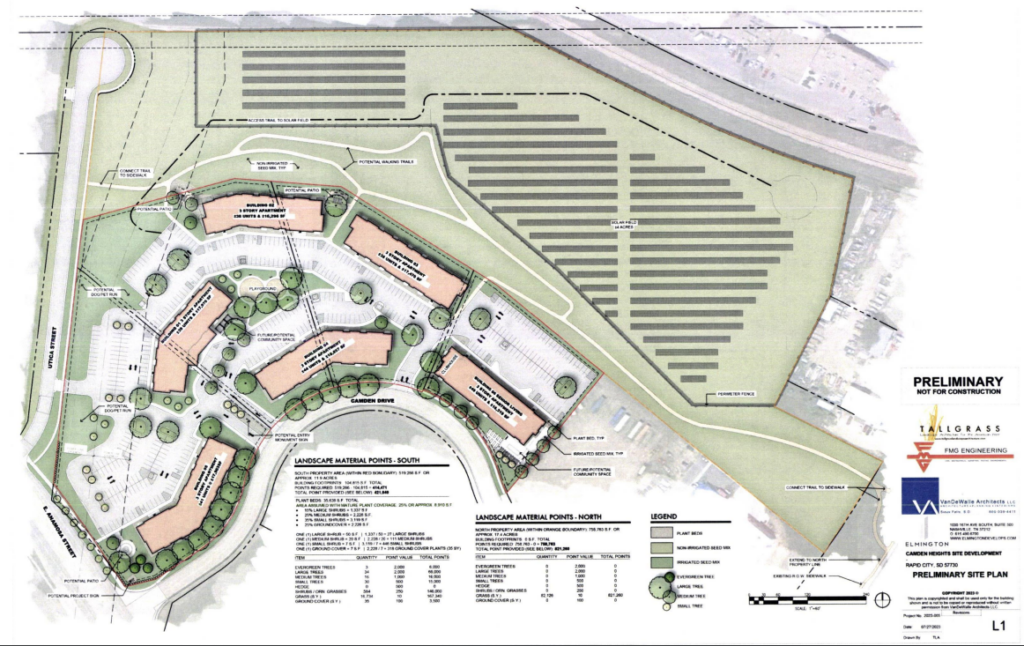
(Joshua Haiar – South Dakota Searchlight) – In what’s being described as a rare project for South Dakota, a developer is planning a six-building apartment complex in Rapid City with enough solar panels to offset all of its energy use.
The housing will be available to those earning 60% or less than the average income in the area. The project — one of several around the country by Tennessee-based Elmington Capital Group — will cost about $78 million, according to local company representative Ryan Tobin. About 70% of the money will come from federal, state or local government sources, including incentives for sustainable development.
“Being from South Dakota myself, I am very excited for this project,” Tobin said of the Rapid City proposal. “We are responding to a housing need the city has identified.”
That need was highlighted in a housing study commissioned by the Elevate Rapid City economic development group. The study identified a need for more than 1,300 rental units for people and households earning less than the median income in Rapid City.
The project, located at 1725 Camden Drive in eastern Rapid City, near a shopping area anchored by a Menards store, will feature 200 family units and 49 senior living units distributed across the six three-story buildings. The development is on 27.53 acres.
The site will contain 440 parking spaces, three communal patios, two community spaces, a playground, a dog park and walking trails.
In a partnership with RPG Energy Group, 15.5 acres of the development will feature a solar array with 3,600 panels that will produce enough electricity during the daytime and send enough extra energy to the grid to offset 100% of the development’s electricity use. The complex will also have a battery system to store solar energy for peak-use periods.

Rather than supplying and measuring electricity for each individual unit within the complex, the energy company will supply power to the complex as a whole. The bill will be split evenly among residents.
The South Dakota Public Utilities Commission approved that arrangement earlier this month.
However, Commissioner Chris Nelson said the solar panels would take up “a huge chunk of property within the city limits of Rapid City” and expressed reservations about the public money supporting the project.
Colton Cooper with RPG Energy Group said that while 15.5 acres in Rapid City sounds like a lot, the property itself has a substantial amount of hilly topography that would be very difficult to develop into much else.
Nelson replied, “Thank you, I appreciate the answer. I’m not sure I feel better about it knowing that I’m the taxpayer paying for all of this, but I do appreciate your answers. Thank you.”
Ryan Tobin said about $23 million of the $78 million cost will be privately funded, with the rest coming from federal tax credits and state and local grants or loans. The funding package includes $35 million from the federal low-income housing tax credit, and $3.6 million from the Biden administration’s Inflation Reduction Act incentives for solar energy.
Earlier this year, the South Dakota Legislature approved spending $200 million on housing infrastructure development through grants and loans. Rapid City hopes to receive $15 million of that, and Elmington Capital is requesting $1.4 million of the city’s share of the funding.
The project’s preliminary subdivision plan and initial planned development overlay have been approved by Rapid City officials.
Laura Jones, Elevate Rapid City’s housing and community development manager, said in an emailed statement that the solar energy will help keep utility costs down.
“And,” she added, “it provides housing for seniors, who have been largely overlooked with recent construction.”
